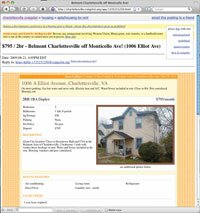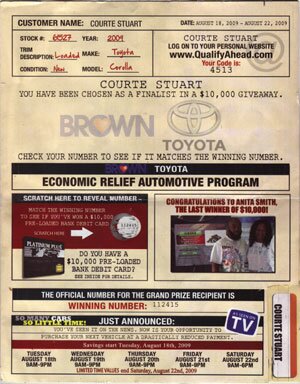COVER- Over a barrel: As economy worsens, so do the scams

John Cheatwood: "I kept thinking the bank would figure it out and pay me back."
PHOTO BY COURTENEY STUART
In 1934, during one of his bank robberies, Chicago gangster John Dillinger famously refused to take a one wad of cash because it was still in the hands of the customer. Now, a Virginia man wants the same respect.
The man, John M. Cheatwood, 52, says that a huge bank robbery has occurred at BB&T but that because all the money was yanked from his account in a wire transfer, he's the one stuck with the bill. It's quite a bill– nearly $329,000– and he's suing the alleged robber and the bank.
"I kept thinking the bank would figure it out and pay me back," says John M. Cheatwood of Warrenton. "But they're not helping; they're obfuscating."
The bank, however, doesn't see it that way. In a response filed in late July, BB&T blames Cheatwood's company for "its own acts and/or admissions."
"They think I compromised my information," says Cheatwood. "They think I wasn't careful with my password."
Denying that allegation, Cheatwood says he hired a retired FBI agent as a private investigator who cleared him and his employees of the errant transfer– even, Cheatwood claims– showing that none of the company computers were powered at the time of the costly incursion.
As many credit card users know, their bank may come calling for verification when someone attempts to make an unusually large transaction. Unfortunately for Cheatwood, that doesn't happen when your daily business is processing six-figure real estate deals.
According to the amended lawsuit complaint, filed in May in northern Virginia federal court, an illicit transfer swiped $328,540.79 on Janaury 8, 2007. The money didn't even belong to Cheatwood; it was entrusted to him by a would-be home-buyer and placed in an escrow account.
Amazingly, it could have been worse. A second mysterious transaction– this one more than $452,000– occurred 10 days later. That one, fortunately, was spotted instantly by Cheatwood and reversed.
With customers counting on him to safeguard their money, Cheatwood says he had to borrow money to keep his customers whole and let their home purchases go through. But the lost cash has been taking a toll on him, his wife, and their two sons. Paying that loan, he says, has dropped his net income to zero and two of his own properties have been forced into foreclosure.
Cheatwood, 52, says he knew in 2006 that the he wouldn't be able to maintain the expansion of Closing Connection– which had grown from one person in one office to 22 employees in nine offices during the real estate boom. He just never expected all to start crashing in a single day.
Since the debacle, the Closing Connection– whose Charlottesville office was located in the 600 block of East Jefferson Street– is back to a staff that consists of Cheatwood only, and his office is the car he uses to see clients all over the state.
Cheatwood says he's particularly incensed that his corporate undoing could happen on the watch of one of the nation's biggest banks. And he rues the fact that the FDIC, or Federal Depositors Insurance Corporation, which many people entrust to repay depositors up to $250,000, does nothing for him.
"The FDIC covers when the bank is unable to pay," explains Cheatwood. "Not when it's unwilling to pay."
Cheatwood says he's been so frustrated that he's thus far resisted the temptation to call 911 and report a bank robbery. He has, however, shared his story with tellers at various BB&T branches.
"We just want the bank to do the right thing," says his lawyer, Rand Gelber. "Someone hacked into the system; the system was vulnerable."
The lawsuit claims the money went into an account at the Fifth Third Bank in Michigan, remained there for less than a day, and then was transferred to Russia, a nation now so mired in lawlessness that hope has dimmed for ever retrieving the money.
As for the holder of the Detroit account, the suit blames Carter Advisors International, Inc., a company located at Suite 355 at 43173 Woodward Avenue, in what appears to be a strip shopping center in Bloomfield Hills, Michigan, a Detroit suburb.
Getting information from the company or its principal, Kevin Anthony Carter– also known, according to the suit, as Anthony Kevin Carter– isn't easy.
Cheatwood's attorney says Carter has thus far managed to elude service of the suit even though it was originally filed in January. A person answering the phone at Carter Advisors as "Angela" would tell a reporter only that she would pass messages along to Mr. Carter. Multiple messages, however, were not returned.
As for the bank, spokesperson Andrea C. McGraw declined to answer questions. And Cheatwood has dozens.
For starters, he wants to know how many other customers this has happened to. What was the IP address of the computer that accessed his account? Does BB&T encrypt data? How long does account info stay in a computer?
"By policy," says McGraw, "we don't comment on pending litigation."
Already, plaintiff Cheatwood has beaten back two motions to dismiss the suit against the bank. And with a pretrial conference slated for September 17, he yearns for his day in court.
"I paid everybody everything that I owed them," he says, "and I didn't go hide, so I feel I have a strong credibility factor.
One thing he hasn't lost is his sense of humor.
"With a name like Cheatwood," he says, "you gotta be honest."
Too good: Latest scam lures renters
BY LISA PROVENCE
Much like viruses, Internet scams are always mutating, and quite often they're from Nigeria.
The most recent variation to hit town spoofs the rental ads of legitimate agents on Craigslist, offering properties for rent at much lower rates.
For instance, a two bedroom on Elliott Avenue renting for $795 shows up in the scam version for $550 a month and needs to be rented quickly with no credit check.
Those who reply get an email purporting to be from Jason LeBlanc, a real person who handles 140 rental properties at Century 21. Only the email address is fake as well.
"This gentleman is taking my name," complains LeBlanc. "There's a long, elaborate story that he's had to move to West Africa, and to send the money anyway." He says he had at least 10 people who emailed the fake ads call him, and two of them filled out a lease.
Radhika Madana Mohan was looking for a place to live and inquired about the Elliott Avenue apartment. She'd already talked to the real LeBlanc, and when she called him, he told her the email with the cheap rent was a scam.
"I got a couple of emails from people using West Africa," says Madana Mohan, who advises others looking for rentals not give out personal information.
The telephone number on the fake LeBlanc email is Nigerian, and FYI, calls to Nigeria cost $5.95 a minute. The subscriber to the number on the email was not available and the Hook was advised to try its call again.
So far, LeBlanc isn't aware of anyone who actually sent money, but he does worry about identity theft– both his own and of the people who filled out the rental application.
He's also had to deal with callers accusing him of bait-and-switch and false advertising when they find out the rent is higher than what they saw on the bogus Craigslist ads.
Century 21 is not the only real estate agency recently spoofed.
"I reported several incidents we were aware of to Craigslist," says Candice Holleran at Real Property. "Luckily, I had a sample of what was being sent."
Since reporting the fakes, she isn't aware of any more targeting her company's rentals.
"It is terrifying," says Holleran. "They do have our actual information."
"Besides the fact that it's horrible, it takes a lot of time," says Ray Caddell, who owns several rental properties. When would-be renters lured by the low, low rent are unable to reach the alleged agent, they look up the owner on public property records– and then call Caddell.
"This is bad," he says. "This is really preying on people who really need that low rent."
Caddell repeats the warning your mama told you: "If it's too good to be true... "
Correction October 1– Radhika Madana Mohan's last name has been corrected, as was the statement that she recognized a phone number as being Nigerian.
Flyer, liar: Dealership's prize pitch deemed illegal
BY COURTENEY STUART

A flyer sent out by Brown Toyota in mid-August seemed to promise a big cash prize.
PHOTO BY COURTENEY STUART
If you have a mailbox, you've almost certainly received one: a flyer flashily promoting a business, offering some kind of discount or incentive to lure you in. But a glossy four-page brochure sent out last month by Brown Toyota had some recipients actually believing they'd won $10,000, and sparked an investigation by the government agency that oversees car dealers.
"Match the winning number to see if you've won a $10,000 pre-loaded debit card," instructs the flyer Brown sent out in the middle of August announcing an August 18-22 promotion at the Pantops-area dealership. To the initial delight of some recipients, the number they scratched off matched "the official winning number for the grand prize recipient."
Told to "see inside for details," recipients who turned the page were greeted by an actual plastic debit card embossed with their name, and, once again, the "winning number"– which matched theirs. While most such offers are accompanied by an asterisk– a strong clue that there's a catch– no such asterisk was visible next to those words.
Even without an asterisk, most people are cynical enough to doubt such too-good-to-be-true ploys. However, this particular mailing was confusing even to certain well-educated consumers.
"It took me a couple of minutes to figure out how I hadn't won," says Michael Lichtenstein, an attorney who received a flyer at his Ridge Street neighborhood home. Lichtenstein, one of his legal colleagues, and his UVA physician wife, all examined the document with initial confusion, he says. Only buried in the almost microscopic fine print does the pot of gold begin losing some luster: "If the winning number on your invitation is posted at the dealership, you may choose which prize to redeem," it reads.
Among the prize choices: the $10,000 debit card, a $10,000 Sea-Doo watercraft, $100 cash, or a Virginia lottery ticket. According to the odds, also published in fine print, chances of winning either amount of money or the jet ski were one in 35,000.
"When it takes a long time to zero in on the one hitch, I just find it more misleading," Lichtenstein notes.
A Hook reporter, who also received the flyer, visited the dealership on the final day of the promotion to "claim" a prize– which turned out to be a $2 Virginia Lottery ticket, and a losing one at that. (The fine print notes that the chance of winning the lottery ticket was 34,998 in 35,000.)
While Brown is a locally owned dealership, it was staffed the day of the reporter's visit by employees of American Hole 'N One, a Georgia-based marketing firm that handles all aspects of dealership promotions across the country– from creating and mass-mailing flyers to providing staff to handle the influx of potential customers.
One American Hole 'N One staffer at Brown that day declined to give his name but defended the mailer and explained why the promotions are so appealing to dealerships. While thousands of the flyers are sent, the marketing firm's research, he said, shows that only four to six percent of recipients actually bring the flyer to the dealership to check their number against the winning number posted there.
That means there's approximately a 95 percent chance that the winning number will wind up in someone's trash. The dealership simply buys an insurance policy for the unlikely case a winner actually appears to claim the prize.
"We haven't seen a winner in six months," said the salesman, who travels the country and would be leaving Brown after that day.
"Don't people get angry when they realize they've driven to the dealership, and they haven't actually won?" this reporter asked.
"Sure," he said. "But they have won something. It's perfectly legal."
Except that it's not.
After reading a copy of the flyer, the Virginia Motor Vehicle Dealer Board, a government agency that regulates car dealerships, ruled the flyer violated Virginia law regulating advertising and consumer rights.
"For all intents and purposes, you think you've won," says Bruce Gould, executive director of the Virginia Motor Vehicle Dealer Board. "What you have in the ad and the disclaimer can't contradict each other," he says.
An American Hole 'N One salesman was asked to refer a reporter to an appropriate spokesperson, but his response provided more challenge than assistance. "I'm good at my job," he said, "and I'm sure you're good at yours. You can figure it out."
A media spokesperson for American Hole 'N One declined comment but promised to pass the message along to a superior. No one returned the call. Messages left with Brown management similarly went unreturned.
This isn't the first time a Brown Automotive affiliate has gotten embroiled in fairness questions over one of its promotions. Last year, a "free gas" offer turned out to require gobs of paperwork, an upfront participation fee, and no guarantee of free gasoline.
Despite that controversy, Gould says his agency has no previous complaints on file about Brown Toyota and therefore simply sent an "educational warning letter," sparing the dealership the maximum fine of $1,000 per occurrence.
"They will be fined if it happens again," he notes.
Lichtenstein hopes he won't receive any similar mailings from Brown in the future.
"It's an obnoxious tactic," says the lawyer. "I consider them to be a reputable local company, and this kind of sales gimmick doesn't really comport with their reputation."
#


8 comments
City Scam with a license: The City licenses vendors to pedal their wares door to door. This summer a group got a city license to let youth from out of town go door to door and sell magazines. Apparently not the kind of group you want checking out your house. One youth found an open door and stole a laptop.
The same group came to my house. They were rude and threatening as I sad no to buying. I won't give them the time of day.
My 18 year old son was almost a victim of the cheap apartment scam on craigslist. Fortunately when it came time to turn over the credit card number he became suspicious. He then goggled the email account and discovered this person had cheap apartments for rent on craigslist all over the nation.
"I'm good at my job," he said, "and I'm sure you're good at yours. You can figure it out."
absolutely brilliant!
Last year I had a similar run-in regarding a beautiful 3500 sq ft house in Ivy for rent for $1200...heated wood floors, italian tile, blah blah. The "reverend" wanted to share his good fortune with someone else in the area but had to leave rather quickly to go to South Africa on some mission. It was way too good to be true. And, well, one lesson learned in this word that if it looks too good to be true, it usually is.
I recently came across your blog and have been reading along. I thought I would leave my first comment. I don't know what to say except that I have enjoyed reading. Nice blog. I will keep visiting this blog very often.
Susan
http://pay-dayadvance.net
Hmm.. I am quoted here. However, I think the reporter misquoted me.
I didn't not mention anything about a Nigerian phone number. In fact, I just said that the person who had emailed me said he was moving to West Africa he was using Jason Leblanc's name. And his place was vacant. Perhaps the phone number listed was a Nigerian phone number, I didn't contact it.
My incident was basically I had seen Jason's name. I already had prior conversations with the real Jason so I had his VA number already saved. And he informed me that there had been an apt available but it was $795 and someone was perhaps scamming.
And my last name is Madana Mohan.
Thank you.
Radhika